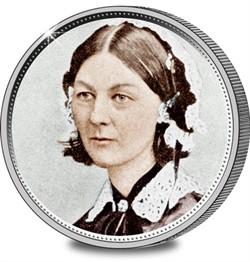
 |
Full name: Florence Nightingale
Born: 12th May 1820
Place of Birth: Florence, Italy
Occupation: Superintendent Nurse
Died: 13th August 1910
|
Florence Nightingale, often referred to as the founder of modern
nursing or the 'lady with the lamp' was born on 12th May 1820 and
named after the Italian city she was born in. Florence was
born into an upper middle class family and was raised on her
family's estate at Lea Hurst in Derbyshire. Florence was
given an intense, rich education and her family believed that
nursing was an unsuitable job for her considering her privileged
upbringing.
Against her family's wishes, Florence spent three months
training as a nurse at the Institute of Protestant Deaconesses at
Kaiserwerth in Germany and visited various hospitals in a number of
European cities where she gathered details of each hospital's
conditions and methods in nursing. On her return, Florence
became Super Intendent of the hospital for Invalid Gentlewomen in
Harley Street. In 1844, Nightingale returned to London to
take a nursing job in a Middlesex hospital for governesses and was
promoted to super intendent after just one year. Nightingale
successfully lowered the death rate and improve hygiene conditions,
which she achieved successfully.
In 1854, Florence was commissioned by the Minister of War,
Sidney Herbert, to help reform the medical facilities and care on
the front line in the Crimean War by becoming Super Intendent of a
team of nurses in military hospitals in Scutari in Turkey.
Herbert expected Nightingale to discontinue the suffering
experienced by soldiers and she became well known as 'the lady with
the lamp', due to her famous ward night checks.
Nightingale successfully improved the conditions in military
hospitals and reduced the number of deaths dramatically.
Whilst in the Crimea, Nightingale produced the reprot 'Notes on
Matters Affecting the Health, Efficiency and Hospital
Administration of the British Army', which proposed reforms and
prompted the establishment of the Royal Commission for the Health
of the Army.
On her return to Britain, Nightingale founded the Nightingale
training school for professional nursing at St Thomas' Hospital in
London, which gave the nurses new ideas and strategies to implement
in other hospitals across the country once their training was
complete.
Florence's revolutionary nursing techniques were published in
the book 'Notes for Nursing' and her influential strategies and
plans are still used in hospitals today. International Nurses
Day is celebrated every year on Florence's birthday. As a
result of Nightingale's training schools for nurses, in 1877, the
war office decided to decided to increase the number of female
nurses in military hospitals.